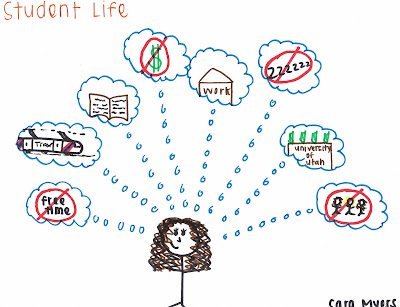DOVER BEACH
The sea is calm to-night.
The tide is full, the moon lies fair
Upon the straits; on the French coast the light
Gleams and is gone; the cliffs of England stand;
Glimmering and vast, out in the tranquil bay.
Come to the window, sweet is the night-air!
Only, from the long line of spray
Where the sea meets the moon-blanched land,
Listen! you hear the grating roar
Of pebbles which the waves draw back, and fling,
At their return, up the high strand,
Begin, and cease, and then again begin,
With tremulous cadence slow, and bring
The eternal note of sadness in.
Sophocles long ago
Heard it on the A gaean, and it brought
Into his mind the turbid ebb and flow
Of human misery; we
Find also in the sound a thought,
Hearing it by this distant northern sea.
The Sea of Faith
Was once, too, at the full, and round earth's shore
Lay like the folds of a bright girdle furled.
But now I only hear
Its melancholy, long, withdrawing roar,
Retreating, to the breath
Of the night-wind, down the vast edges drear
And naked shingles of the world.
Ah, love, let us be true
To one another! for the world, which seems
To lie before us like a land of dreams,
So various, so beautiful, so new,
Hath really neither joy, nor love, nor light,
Nor certitude, nor peace, nor help for pain;
And we are here as on a darkling plain
Swept with confused alarms of struggle and flight,
Where ignorant armies clash by night.
SUMMARY
DOVER BEACH
The sea is calm that night. The sea is full of tides and the night is filled with moonlight. the armies - are involved in battle on the shore. But the armies are calm as it is night.
The poet then calls his beloved to come to the window and watch the beautiful night. And the horizon where the sea appears to meet the moon. If one can listen intently, one can also hear the sound made by the pebbles drawn in and thrown out by the waves of the sea. These sounds strike a note of sadness that is universal.
Long ago the same misery struck the lives of the characters created by Sophocles. The tragedy is intensified in modern days by the loss of faith. Once upon a time the sea of faith was full. As the waters surround the earth, faith used to form a protective ring around human life. But in modern times that faith has disappeared and its faith cry is heard far away. It has shrunk and withdraw itself to the edge of the earth.
Then the poet makes an earnest appeal to his beloved. He asks her to help him create an ideal world within their room. The world outside has no joy, no love, no light, no peace, no help and above all no faith. So he requests his beloved to come forward to create a beautiful, new world. The world out side is a dark plain where the armies clash with each other in the night and are ignorant of what they are doing. The poet meas that the individual should develop a sense of peace and joy to compensate the general loss and try to help himself in this dark ignorant world.
RELATED VIDEO
BY MATHEW ARNOLD
















